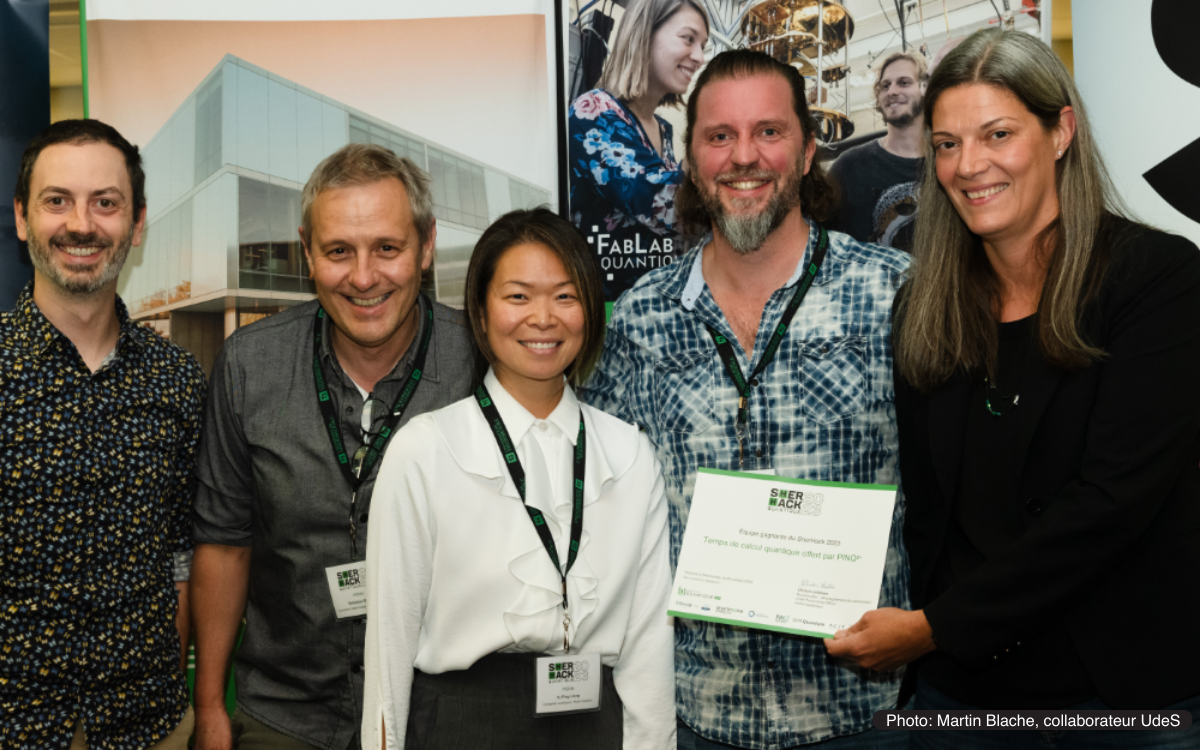News
Sherbrooke hosts its first Quantum Hackathon
Sherbrooke’s first Quantum Hackathon, the SherHack, took place on October 26th. The event was organized by Institut quantique in collaboration with DistriQ, Sherbrooke Innopole and Québec Quantique. It was an opportunity to bring companies together and introduce them to quantum programming with a workshop and a series of technical challenges to be solved on IBM’s quantum systems.
A FIRST STEP INTO QUANTUM COMPUTING
In all, 15 teams of programmers from nine companies, including CGI, KPMG, Sherweb and Ubisoft, as well as government agencies including Hydro Québec, Natural Resources Canada and the ministère de la Cybersécurité et du Numérique, took part in SherHack’s first edition. The hackathon gave many people their first taste of quantum computing. Teams had the opportunity to launch their solutions on IBM’s quantum computer located in Bromont.

A common denominator among SherHack participants was their knowledge of classical programming. The event was an opportunity to apply a new approach specific to quantum computing to solving complex problems, a field which could, in time, have a significant impact for several information technology (IT) companies.
“It’s a complicated concept to introduce, but I think it was very well done, says Ouamer Dahmani, technical lead at Ubisoft. It’s an appetizer that gives you an idea of where the industry is heading in perhaps ten years’ time. The aim was to understand what the challenges are and the new way of thinking it requires.”
“These are not tools we’re used to working with, admits Tanguy Hulpiau, developer and infrastructure manager at Sherbrooke-based Dunin Technologie. Our big challenge today: we had some interesting models, but they were difficult to apply. It was really relevant!”
For Ghislain Lefebvre, Partnership Development Manager at IQ, one of the challenges of switching from classical to quantum programming is the paradigm shift: “We’re presenting an approach that isn’t intuitive, even for people with a lot of programming knowledge and experience. It’s often said that programmers need to be reprogrammed!”
BRINGING TOGETHER KEY PLAYERS IN THE ECOSYSTEM
With the launch of the quantum computer in Bromont last month and the development of the quantum innovation zone in Sherbrooke, this first quantum hackathon comes at an exciting time for the field.
“This hackathon organized by IQ was eagerly awaited! DistriQ felt it essential to participate by helping with the organization and offering its premises. It was in our current offices that over 60 people from SMEs and large Quebec organizations were able to learn about quantum programming. We’re looking forward to collaborating on the next edition,” says Éliane Leblanc, Ecosystem Manager for DistriQ.
“Sherbrooke Innopole is proud to be associated with the first SherHack to facilitate links with Sherbrooke’s IT business community. The event is a wonderful opportunity for companies to demystify quantum computing, to learn how to program on a quantum computer, to learn this new language and new ways of approaching problems, says Marc-Henri Faure, Director, Business Services, Quantum and Information Technologies at Sherbrooke Innopole.
A panel of judges chosen from Estrie’s quantum ecosystem, including 1QBit, members of the Université de Sherbrooke and IBM Quantum, evaluated the solutions developed by the teams during the afternoon.
OFFERING AN ENRICHING EXPERIENCE
It was a busy day for the AlgoLab team as they developed the series of technical challenges to be solved. The morning began with a workshop in quantum machine learning delivered by Jean Frédéric Laprade, a quantum computing developer at IQ. Participants were supported in the afternoon by mentors from AlgoLab’s quantum programming team and PINQ2 to answer questions.

“We wanted to give the participating teams a realistic idea of what quantum computing can currently do, and what kinds of problems we could envisage tackling, emphasizes Jean Frédéric. To achieve this, we took the teams through a quantum machine learning challenge, which involved training a model to classify a local dataset.”
The dataset came from the analysis of water samples taken from Lake Memphremagog in 2021 by Céline Guéguen’s team, a professor in the Chemistry Department at the Université de Sherbrooke. As part of the hackathon, the teams worked with nine chemical markers to train a quantum classifier to predict which class of molecules a sample belonged to.


At the end of a busy day, representatives from the local company Menya Solutions, Levio’s AI arm, took first place, while a team from Hydro Québec came in second.
